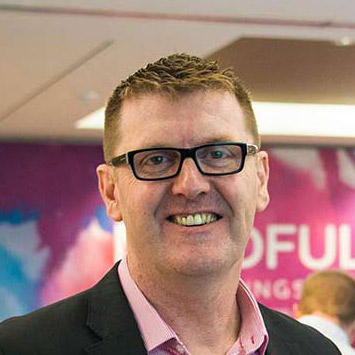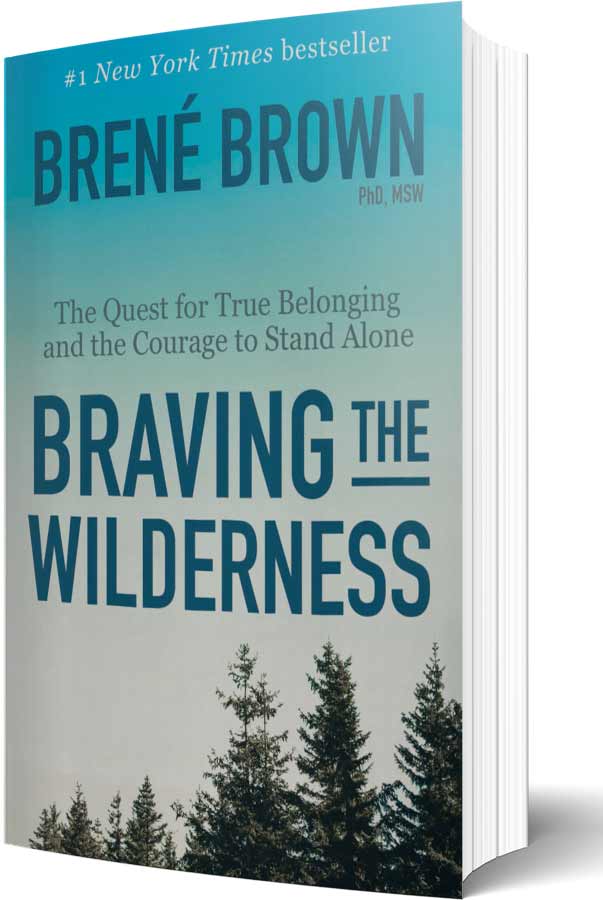Braving The Wilderness
The Quest For True Belonging And The Courage To Stand Alone
This review comes with a twist. It’s both a book review and for the uninitiated an introduction to Brené Brown.
Brené Brown has become one of the most popular speakers, podcasters, and authors in the personal development space with her work on how to become a wholehearted person through the courage of being vulnerable.
Brown, I believe, has tapped into the global zeitgeist on the power of embracing our vulnerability and confronting our shame. Only then, are we able to lead a full and authentic life where we are worthy of connection.
I’m not alone in being a big fan of Brené Brown. She regularly comes up when we are running Proteus workshops and development programs as one of the most inspirational and relevant global speakers of our time.
What’s fascinating is that typically about a third of our audience will talk passionately about the profound positive impact that Brené Brown has had on their lives both personally and professionally. The rest of the audience will say “Brené who?”.
Who is Brené Brown?
Born 1965 in Texas, Brown is a social worker, an American professor, lecturer, author, and podcast host. From an obscure academic as an Associate Professor at the University of Houston… Brown has become a global juggernaut with her research on vulnerability.
Brown simply says, she is a ‘researcher and storyteller’ who is ‘currently enraged’. This is Brown’s statement from her website:
“The bottom line: I believe that you have to walk through vulnerability to get to courage, therefore…embrace the suck. I try to be grateful every day, and my motto right now is Courage over comfort.”
What catapulted Brown to global fame was her Houston TEDx talk in 2010 ‘The Power of Vulnerability’ which is still one of the five most viewed TED talks.
If you have not viewed this iconic TED Talk, please do! It will be 19 minutes of the best personal development that you will spend. Then if you are looking for some inspirational but challenging books for development, I hope that Brené Brown becomes your new ‘go to’ author.
Braving the Wilderness
“We have to step out from behind the barricades of self-preservation and brave the wild.”
If you are going to read just one of her six New York Times best-selling books that includes ‘Rising Strong’, ‘Atlas of the Heart’ and ‘Dare to Lead’ etc. ‘Braving the Wilderness’ is not only brilliant, for me it sums up why Brown is such a phenomenon.
Originally published in 2017, Braving the Wilderness is where Brown candidly shares childhood challenges, family disruptions and dysfunctions, early addictions, and her deep ‘quest for true belonging’.
Brown was determined to take complete control of her life, only to discover that you need to let go of control, and venture (metaphorically) into that unpredictable vast place of the wilderness. It turns out that this uncontrollable and untamed wilderness is the place to find true belonging.
In Brown’s first chapter ‘everywhere and nowhere’ she describes in her early years of trying desperately to ‘fit in and the ache of not belonging was one of the most painful threads in my own life’ where Brown was continually and deeply challenged by her counsellor and favourite author Maya Angelou.
This is the quote from Angelou’s poem ‘Still I Rise’ that continued to disturb and haunt Brown:
‘You are only free when you realize you belong no place – you belong every place – no place at all. The price is high. The reward is great.”
What Brown eventually discovered was how profoundly true Angelou’s statement is. Living this paradoxical life of ‘belonging and not belonging’ was firstly all about gaining the courage ‘to stand alone… totally alone’.
Being our true authentic self is about ‘belonging to ourselves’. This means ‘being called to stand alone – to brave the wilderness of uncertainty, vulnerability and criticism’.
True belonging is not passive. It’s not fitting in. Nor is it selling out because it’s safer. It’s a practice that requires us to ‘get uncomfortable’ and ‘be present with people without sacrificing who we are’. The price is high. The reward is great.
Brené Brown’s Paradoxical 4 Step Practices
Inspired by Carl Jung’s contention that the ‘most valuable spiritual possessions and a great witness to the truth’ is about embracing the paradox of life. Brown has crafted four ‘paradoxes’ to live your life by where you can stand alone while simultaneously being connected to the world.
- People Are Hard to Hate Close Up. Move In Brené demonstrates how easy it is to become polarised and how tempting it is to label people who think differently as bad and wrong. We need to live by higher standards. It is easy to hate a group of people but very hard to hate the individual. The worst thing we can do as a society is to ‘dehumanise’ groups of people. The courage comes by letting other people in and not always walking alone. So, move closer, lean in, and acknowledge each and everyone’s individual humanness. It’s a much more wholehearted and connected way to live.
- Speak Truth to Bull****. Be Civil Brown’s research discovered that personal pain that is denied or is ignored, manifests itself as fear and hate. This unresolved pain then makes it so easy to create a BS story that ‘you are either with us or against us’. Here we feel justified in being constantly uncivil to people’s ‘otherness’. Brown compels us all to stop the BS with ourselves. Then speak the truth to the BS of others but always be civil no matter what. This is challenging but it is critical that we combine the two. We don’t need to default to taking sides. Just be honest and say that you don’t know everything while always staying curious.
- Hold Hands. With Strangers People want and crave deep human connection. Brown’s research shows, the power of sharing both our joys, and our sadness with others. Not only with the personal relationships and communities that we know, but with strangers! As Brown clearly states: “Not enough of us know how to sit in pain with others. Worse, our discomfort shows up in ways that can hurt people and reinforce their own isolation.”
- Strong Back. Soft Front. Wild Heart Finally, Brown comes back to the power of vulnerability. Work on being more courageous (with a strong back), become more vulnerabile and honest (with a soft front) while being ourselves (with a wild heart).
So, if you are a first timer to Brené Brown’s work, I simply encourage you to jump on board. Listen to her podcasts, watch her TED Talks, read her articles and books.
If you are already a fan of Brené Brown, go ahead and read Braving the Wilderness. Embrace her paradoxical 4 step practices. It is both challenging and liberating to ‘stand alone in the wilderness’.
Remember, you can always belong anywhere, but only if ‘you show up as yourself’. ‘It’s the bravest and most sacred place you will ever stand’.
The mark of a wild heart is living out the paradox of love in our lives. It’s the ability to be tough and tender, excited and scared, brave and afraid—all in the same moment. It’s showing up in our vulnerability and our courage, being both fierce and kind.

Book review by:
Richard Dore - CEO, Proteus Leadership


